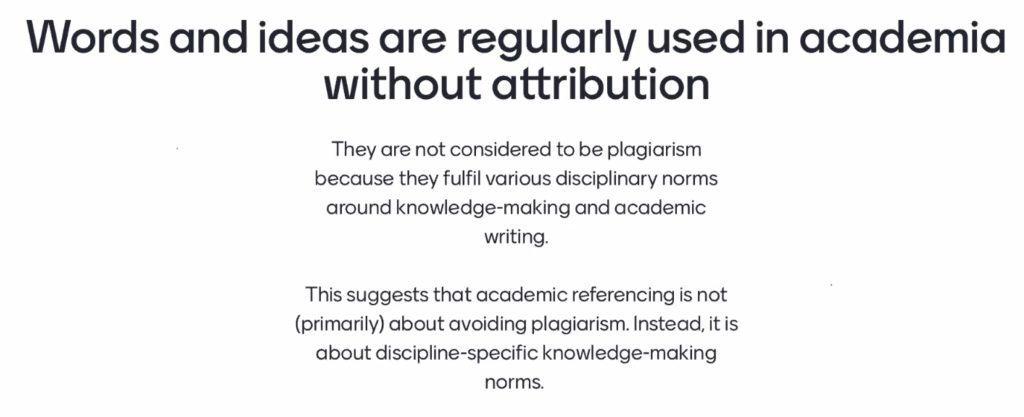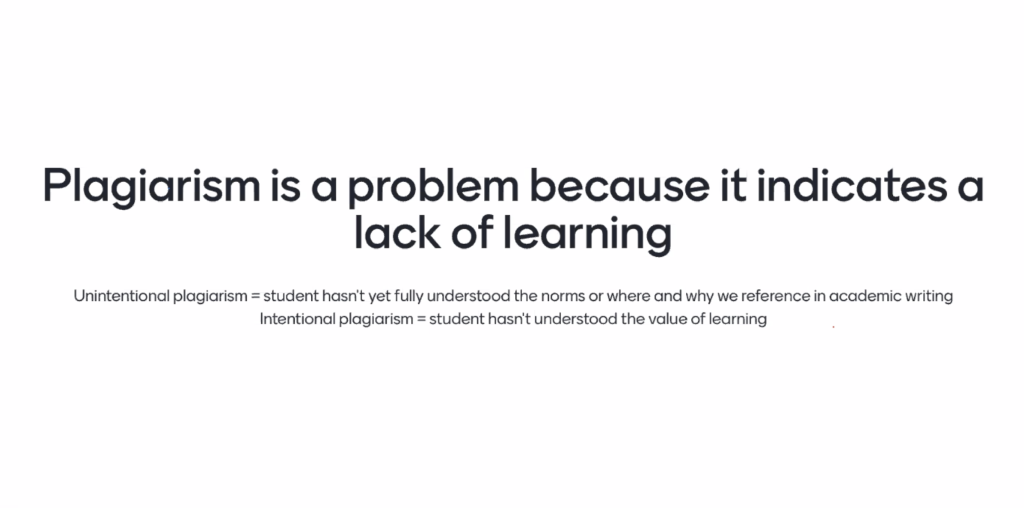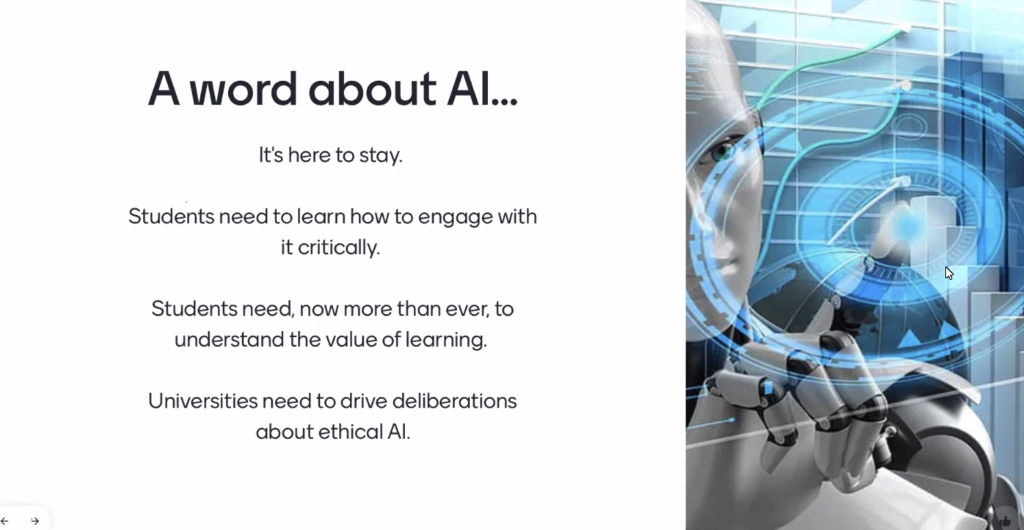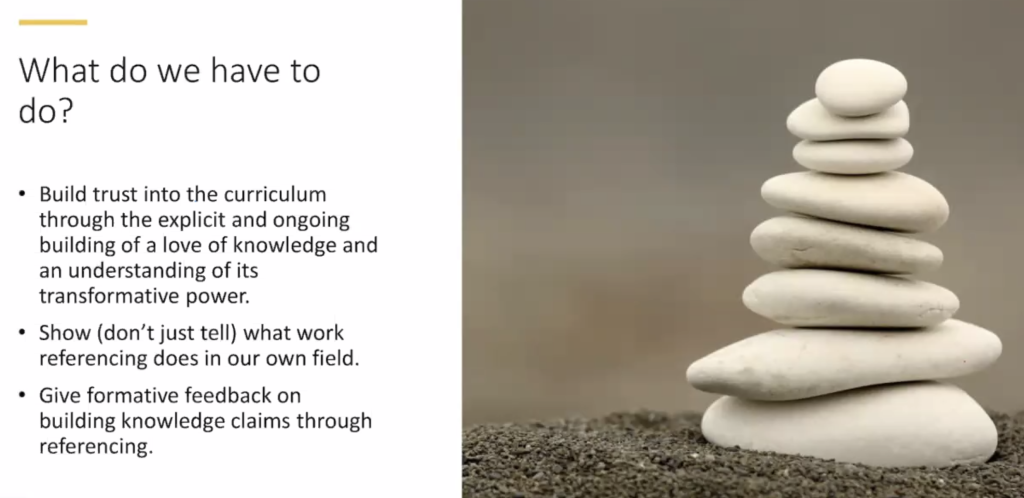Plagiarism is a hot topic, but we’ve completely missed the point.
That’s according to Professor Sioux McKenna, who recently delivered an extremely thought-provoking presentation on this contentious issue called “Plagiarism in the Academy (how we missed the point and what we can do about it)” on July 19/20, 2023. McKenna is Director of the Centre for Postgraduate Studies at Rhodes University in South Africa.
Since when are presentations about plagiarism this mind-altering? The title and abstract had intrigued me—especially the part about AI—and so I joined the Zoom session (yes, at 11pm NZ time on a Friday night!) expecting at most some new tidbits to consider.
I was very unprepared for McKenna’s engaging demeanor and rapid-fire points about how we are going about the issue all wrong. And she cleverly implicated many of us in our current thought patterns by encouraging us to first define plagiarism and referencing in a Mentimeter quiz online.
I took notes fast and furiously. I wondered why I hadn’t heard these points before. Then I started thinking about my own challenges with what to cite, particularly in my upcoming book—which I’ve heavily researched for but want to make accessible to the general public, who don’t care for clunky references that negatively impact readability. It’s like McKenna had pulled back the curtain and exposed plagiarism as something completely different than what I thought it was, and where my focus should be.
Here are my takeaways and reflections, followed by my notes on her presentation:
- Plagiarism and referencing are much more complex than the simplified definitions many of us have, and the lack of evidence that the policing method is effective should have us looking for more authentic assessment opportunities.
- The easy access to information online has already heavily disrupted notions of authorship and attribution, and AI will only accelerate this since it is so easy to create content now.
- In terms of higher education, especially in a world with AI, we have to rethink the mechanisms for assessing and credentialing knowledge, and what the function and value of a degree are for those investing their energy in teaching and learning.
- In terms of authors and content creators, we are looking at a paradigm shift in our relationship with our content and the machines that may be digesting it and repurposing it.
Here’s a recap of McKenna’s presentation:
Plagiarism is our weird system of rules for academic writing. It’s often confused with copyright, but copyright laws differ from country to country. Plagiarism is not a legal issue. Also, most academic publications aren’t even owned by the author but by academic publishing houses.

In fact, plagiarism (as defined by not referencing information sourced from elsewhere) is permitted in lots of cases in the academy:
- In textbooks: We give students textbooks (teaching texts, not academic texts) or lecture notes which don’t use references and then confusingly ask them to not plagiarize when they haven’t seen examples of proper referencing being done. They often haven’t had scaffolded learning about academic writing in a discipline.
- In exams: Students are expected to regurgitate information in exams without citations.
- In abstracts: Journal abstracts don’t generally have references.
- Common knowledge: Things considered to be general knowledge like historical dates aren’t referenced, even though it’s unclear who decides what is general knowledge and this varies from person to person.
- Subsections of articles: McKenna showed examples of journal articles using terms or background information from a particular discipline that everyone within that discipline would know and the author didn’t reference.
Lots of the research literature on plagiarism is descriptive, mapping how plagiarism is getting worse, but not doing much to establish causes or viable solutions. The response to plagiarism is usually police-catch-punish, with zero evidence of effectiveness and ample evidence of its uselessness. Turnitin protects itself from legal liability by saying it’s a similarity checking tool, not a plagiarism checker, even though many call it that.
Some of the causal mechanisms for plagiarism include:
- Assumption that students will cheat: this leads to policies and policing that end up encouraging plagiarism
- Sink or swim mentality: clever students (middle class) will be fine; struggling students (working class) will sink anyway
- Commodification of knowledge: if students’ job is to get a piece of paper so they can get a job, many just want to get through coursework to get to the other side

What if we instead told students about how education can change their view of the world, ethics, their place in society? Some academics are already doing this and trying to help their students think differently. Of course, it’s not easy to ignite passion for knowledge and undermine the simplistic, dominant understanding of what higher education is for. Showing students the power of knowledge is a more ephemeral task, much harder than using Turnitin. But consider how many hours are spent on policing, and how few are spent on addressing the problem of the commodification of higher education. In terms of AI, universities should use their expertise to worry more about how society is using AI, not how students will use it to cheat.

Moral outrage means people show up to plagiarism lectures like this one [there were over 230 people on Zoom, plus more in the room where McKenna was presenting], but no one came to her previous session called ‘Interrogating Academic Writing’. People go round and round blaming lazy students, even when students are not being properly prepared.
She suggested one solution is to show don’t tell. Instead of telling students how to reference, have them go through and forensically example journal articles and why author used a reference or didn’t, and have them tell you why. The fear of plagiarism actually paralyzes students, and now the ones who are being accused of using AI when they didn’t are bearing a high emotional cost. We want strong writers who know the norms in their fields. She praised Wikipedia as her go-to place for starting out, and when someone pointed out the gender bias, she said her center is running an editing program to help diversify Wikipedia – great to see!

Now more than ever, there are serious threats—such as generative AI like ChatGPT—posed to the credentialling function of higher ed, and the question becomes how to address this in the short term.